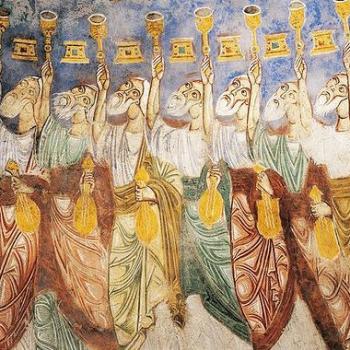Should Churches Engage in Partisan Politicking?
According to news reports, United States President Donald Trump has rewarded some of his religious supporters by signing an executive order ordering the U.S. Treasury Department, which includes the Internal Revenue Service, not to prosecute or otherwise punish religious organizations or their leaders for endorsing or opposing candidates for public office. In other words, according to the news reports I have read, he is nullifying the so-called “Johnson Amendment” which forbade non-profit, tax-exempt organizations, including religious ones, from engaging in partisan political activism.
So far, according to the news reports I have read, the fallout from Trump’s order has been predictable—at least for this time and place. That is, for the most part, left-leaning religious leaders have condemned it and right-leaning religious leaders have applauded it.
*Sidebar: The opinions expressed here are my own (or those of the guest writer); I do not speak for any other person, group or organization; nor do I imply that the opinions expressed here reflect those of any other person, group or organization unless I say so specifically. Before commenting read the entire post and the “Note to commenters” at its end.*
An irony is that the so-called “religious left” (a phrase one hardly ever hears anymore!) used to be even more involved in direct political action than conservative religious groups were. Anyone familiar with the so-called “Social Gospel Movement” of the late 19th and early 20th centuries knows this.
Some years ago I was a member of a left-leaning Baptist church in the downtown of a major American city. One Sunday the pastor stood in the pulpit, during the worship service, and spent about ten minutes directing congregants to write letters to government leaders about specific controversial issues of public policy. He did not endorse or oppose any specific candidates for public office, but the “gist” of his instructions were clearly left-wing and Democratic more than Republican.
After he did that all “hell broke loose” within the congregation and many called for the pastor to be fired for mixing religion and politics. Others, including I, defended him. In my case it wasn’t because I necessarily agreed with the positions he took or his advocacy to the congregation, but it was because we recognized the prophetic role of the pastor (as well as of every well-informed, reflective, mature religious lay person).
During a business meeting called to discuss whether to fire the pastor and amend the church’s constitution to include language forbidding church leaders from engaging in political activism I stood and gave an impassioned speech. I mentioned Germany during the 1930s and asked the congregants what they thought German pastors and priests should have done when Hitler and the Nazi Party were campaigning and then coming into power. Some said things like “Well, that could never happen here.” Others recognized that whatever has happened in history, anywhere, could happen again, anywhere. We are not immune to dictatorship.
Ultimately I was satisfied with the outcome of the deliberations and vote. The pastor was retained, but the constitution and bylaws were amended simply to say that no representative of the church, speaking from the pulpit or on behalf of the church, could endorse or oppose any candidate for public office or any political party. The pastor had done neither of those things.
I still wondered, however, what a Christian church ought to do if America ever faces a situation like that in Germany in 1932 and 1933 (and afterwards). Would we not want our pastors and other religious leaders to speak out against a political candidate like Hitler? (You must remember that in 1932 and 1933 most Germans did not know all of Hitler’s views or plans even though they could have known had they read and taken more seriously his book Mein Kampf!) And many of them voted for him and the National Socialist Party solely because it was their best hope for the defeat of communism in Germany.)
In my opinion, the solution to this dilemma is a middle ground between granting churches and other non-profit organizations carte blanche to engage in political politics and stripping those that do of their tax-exempt status (which the Johnson Amendment led to in some cases). Perhaps the solution should be something like that of a conscientious objector who, when there is a “draft,” can make a case to his Selective Service office that he has always been opposed to war. Under my plan, then, a church (or other non-profit organization) that engages in partisan politicking would have to make a case that the activity aligns with and is even virtually required by the church’s traditions, doctrines, ethos and ethical stances.
This would prevent “political action committees,” for example, from suddenly becoming churches or other religious organizations for the sole purpose of gaining tax exempt status.
In actual fact, however, the Johnson Amendment has rarely stopped churches from engaging in partisan politics because there are so many loopholes in it. It does not forbid a pastor, for example, from endorsing a candidate or party speaking for himself or herself alone. Some did that in the last presidential election. All they had to do is state publicly that, speaking as individual citizens and not as representatives of any church, they endorse a candidate or party. That simple disclaimer got them and their church off the hook. The IRS was not able to punish the church so long as the pastor did not use the pulpit and clearly stated that he or she spoke only for himself or herself. Of course, his or her congregation knew….
So, in sum, I am ambivalent about President Trump’s order nullifying that part of the Johnson Amendment. One the one hand, I would definitely want my pastor and other religious leaders to speak out against any candidate for public office who was a member of a “white supremacist” organization (for example). On the other hand, I would definitely not want my pastor or other religious leaders to abuse his or her religious leadership to engage in partisan politicking from the pulpit except in extreme situations (such as the one I mentioned above).
*Note to commenters: This blog is not a discussion board; please respond with a question or comment only to me. If you do not share my evangelical Christian perspective (very broadly defined), feel free to ask a question for clarification, but know that this is not a space for debating incommensurate perspectives/worldviews. In any case, know that there is no guarantee that your question or comment will be posted by the moderator or answered by the writer. If you hope for your question or comment to appear here and be answered or responded to, make sure it is civil, respectful, and “on topic.” Do not comment if you have not read the entire post and do not misrepresent what it says. Keep any comment (including questions) to minimal length; do not post essays, sermons or testimonies here. Do not post links to internet sites here. This is a space for expressions of the blogger’s (or guest writers’) opinions and constructive dialogue among evangelical Christians (very broadly defined).
















